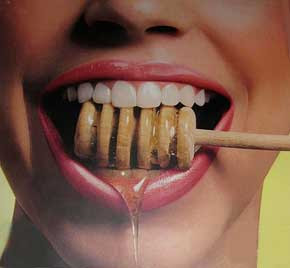
Honey has long been used for its amazing health benefits, both as a dietary supplement and topically on the skin. However, there are many different kinds of honey, predicated on the floral nectar source used by the bees that produce it. Honeybees gather as much floral nectar as they can carry and take it back to their hives where they add enzymes to it to produce honey. Nectar from different flowers can produce variations in the honey, effecting its color, flavor and medicinal qualities. It has been discovered that honey produced from the nectar of the Manuka flower (indigenous to New Zealand) has far more healing properties than any other type of honey in the world.
Manuka Honey contains very powerful particular antibacterial properties and higher level of natural proteins, vitamins and minerals than any other type of honey. It also has the ability to nurture, calm and restore health to sensitive or damaged skin. There are antioxidants in Manuka Honey which neutralize free radicals that are the culprit for most skin cell damage. Manuka honey promotes the growth of new cells and tissue regeneration. It also defends the skin from further damages making it an excellent, natural ingredient in skin care products.
Manuka Honey’s ability to absorb and retain moisture also make it an ideal ingredient in skin care products as it helps to keep skin hydrated. In fact, history shows that ancient beauties such as Cleopatra regularly applied a mixture of honey and milk to the face to keep their skin looking young, radiant and smooth. Honey’s natural antioxidant and antimicrobial properties protect the skin from the damage of the sun’s rays while supporting the skin’s ability to rejuvenate and refresh depleted skin. Honey is also effective in treating acne absorbing impurities from the pores of the skin, making it an ideal cleansing agent.
The most important part of anti-aging skin care lies in the antioxidant protection that can be provided through natural ingredients. Manuka Honey has more antioxidants than any other honey, making it extremely valuable for skin care. It also helps the formation of stronger collagen, makes the skin firmer and assists in the cell renewal process, making the skin appear more youthful. It has the ability to penetrate deeply into the depth of skin tissue and helps to protect the skin against damage from free radicals. Manuka honey is also especially effective in healing infections, acne, psoriasis, ringworm, eczema, wounds and scars. Its healing properties nourish and moisturize the skin.
Most ordinary types of honey are processed and have lost their healing properties when pasteurized. It is beneficial to use natural skin care products that contain Manuka honey. This way you can use it regularly and avoid having sticky skin. For more information or to purchase Manuka Honey products, call 1-866-427-7329 or visit www.HoneymarkProducts.com.







